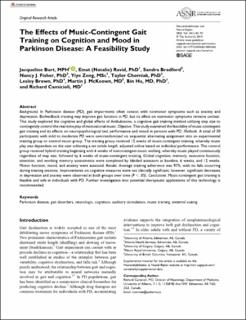| dc.contributor.author | Burt, Jacqueline | |
| dc.contributor.author | Ravid, Einat | |
| dc.contributor.author | Bradford, Sandra | |
| dc.contributor.author | Fisher, Nancy J. | |
| dc.contributor.author | Zeng, Yiye | |
| dc.contributor.author | Chomiak, Taylor | |
| dc.contributor.author | Brown, Lesley | |
| dc.contributor.author | McKeown, Martin J. | |
| dc.contributor.author | Hu, Bin | |
| dc.contributor.author | Camicioli, Richard | |
| dc.date.accessioned | 2020-07-07T10:54:02Z | |
| dc.date.available | 2020-07-07T10:54:02Z | |
| dc.date.issued | 2020 | |
| dc.identifier.citation | Burt, J., Ravid, E., Bradford, S., Fisher, N. J., Zeng, Y., Chomiak, T., . . . Camicioli, R. (2020). The Effects of Music-Contingent Gait Training on Cognition and Mood in Parkinson Disease: A Feasibility Study. Neurorehabilitation and Neural Repair, 34(1), 82-92. | en_US |
| dc.identifier.uri | https://hdl.handle.net/11250/2660959 | |
| dc.description.abstract | Background. In Parkinson disease (PD), gait impairments often coexist with nonmotor symptoms such as anxiety and depression. Biofeedback training may improve gait function in PD, but its effect on nonmotor symptoms remains unclear. This study explored the cognitive and global effects of Ambulosono, a cognitive gait training method utilizing step size to contingently control the real-time play of motivational music. Objective. This study examined the feasibility of music-contingent gait training and its effects on neuropsychological test performance and mood in persons with PD. Methods. A total of 30 participants with mild to moderate PD were semirandomized via sequential alternating assignment into an experimental training group or control music group. The training group received 12 weeks of music-contingent training, whereby music play was dependent on the user achieving a set stride length, adjusted online based on individual performance. The control group received hybrid training beginning with 6 weeks of noncontingent music walking, whereby music played continuously regardless of step size, followed by 6 weeks of music-contingent training. Global cognition, memory, executive function, attention, and working memory assessments were completed by blinded assessors at baseline, 6 weeks, and 12 weeks. Motor function, mood, and anxiety were assessed. Results. Average training adherence was 97%, with no falls occurring during training sessions. Improvements on cognitive measures were not clinically significant; however, significant decreases in depression and anxiety were observed in both groups over time (P < .05). Conclusions. Music-contingent gait training is feasible and safe in individuals with PD. Further investigation into potential therapeutic applications of this technology is recommended. | en_US |
| dc.publisher | Neurorehabilitation and Neural Repair | en_US |
| dc.subject | Parkinson's disease | en_US |
| dc.subject | gait disorders | en_US |
| dc.subject | neurologic | en_US |
| dc.subject | cognition | en_US |
| dc.subject | auditory stimulation | en_US |
| dc.subject | music training | en_US |
| dc.subject | external cueing | en_US |
| dc.subject | Parkinsons sykdom | en_US |
| dc.subject | nevrologiske lidelser | en_US |
| dc.title | The Effects of Music-Contingent Gait Training on Cognition and Mood in Parkinson Disease: A Feasibility Study | en_US |
| dc.type | Journal article | en_US |
| dc.source.pagenumber | 82-92 | en_US |
| dc.source.volume | 34 | en_US |
| dc.source.journal | Neurorehabilitation and Neural Repair | en_US |
| dc.source.issue | 1 | en_US |
| dc.identifier.doi | https://doi.org/10.1177%2F1545968319893303 | |
| dc.description.localcode | måsjekkes | |
